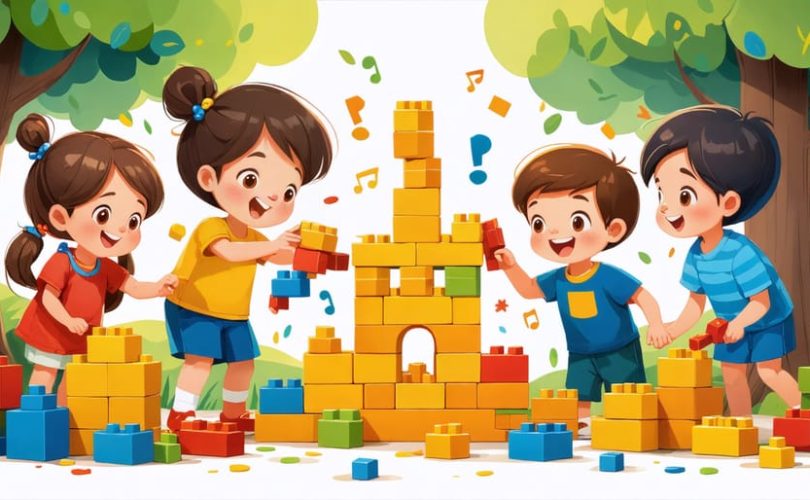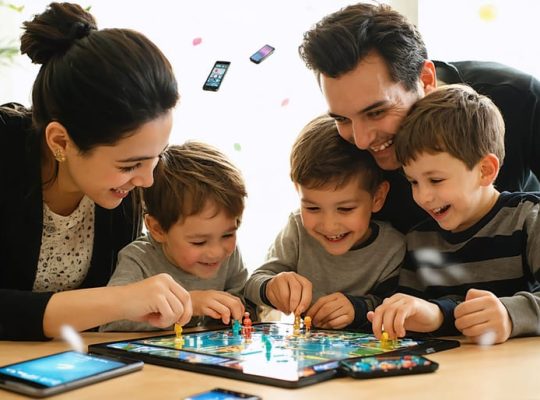Picture a group of preschoolers working together to build an elaborate block castle, each child contributing ideas and pieces while sharing tools and encouragement. This is cooperative play at its finest – a crucial developmental milestone where children learn to work together toward common goals, share resources, and support one another’s success. Unlike parallel or solitary play, cooperative play represents a sophisticated level of social interaction where children actively engage with peers, negotiate roles, and solve problems as a team.
When children engage in cooperative play, they’re not just having fun – they’re developing essential life skills that will serve them well into adulthood. From learning to communicate effectively and regulate emotions to understanding different perspectives and practicing empathy, cooperative play lays the foundation for social competence and emotional intelligence. Whether it’s organizing a pretend restaurant, creating a group art project, or playing team sports, these shared experiences help children develop the collaborative skills they’ll need throughout their lives.
This type of play typically emerges around age 4-5, marking a significant shift in how children interact with their peers and understand social relationships.
What Makes Play ‘Cooperative’?
Key Elements of Cooperative Play
Cooperative play thrives on several essential elements that work together to create meaningful social interactions among children. At its core, shared goals unite players in working toward a common objective, whether building a block tower together or completing a group art project. This shared purpose helps children understand the value of collaboration and teamwork.
Clear communication is another vital component, as children learn to express their ideas, listen to others, and negotiate solutions. Through verbal and non-verbal cues, they develop the ability to understand different perspectives and respond appropriately to their playmates’ needs.
Turn-taking serves as a fundamental skill that children practice during cooperative play. Whether waiting for their turn on the swing or sharing art supplies, children learn patience and respect for others’ needs. This skill helps build self-regulation and empathy.
Group decision-making represents perhaps the most sophisticated element of cooperative play. Children learn to contribute ideas, consider alternatives, and reach compromises. For example, when deciding what game to play or how to solve a problem in their pretend scenario, they develop critical thinking and democratic participation skills.
These elements combine to create rich learning experiences that help children develop crucial social and emotional skills they’ll use throughout their lives.
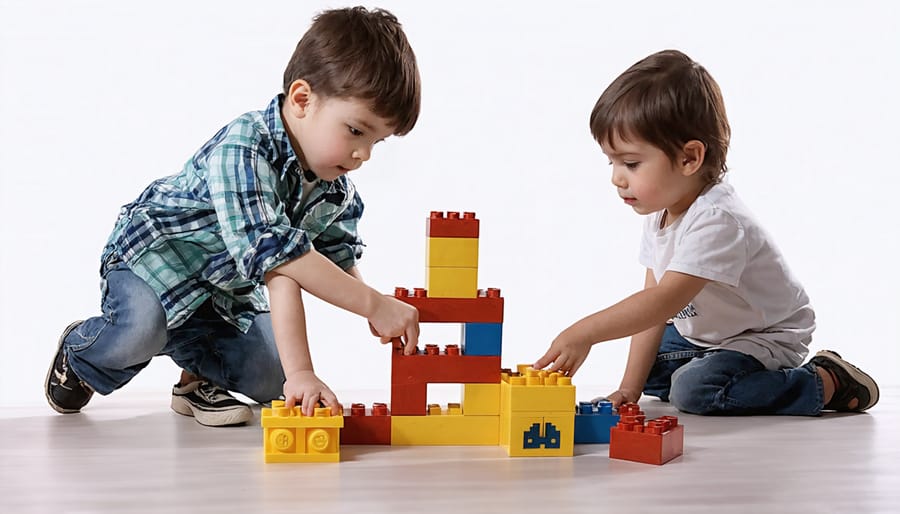
Developmental Stages of Cooperative Play
Cooperative play develops gradually through various child development stages, evolving from simple parallel play to complex group interactions. Around age three, children begin showing interest in playing with others, though their cooperation might be limited. By age four, they start engaging in simple group games and sharing toys more willingly. Between ages five and six, children master taking turns, following group rules, and working together toward common goals. They become more skilled at negotiating roles, solving conflicts, and understanding others’ perspectives. This progression continues through early elementary years, where children develop sophisticated cooperation skills, including planning complex games, assigning roles, and creating elaborate scenarios together.
Social Skills Developed Through Cooperative Play
Emotional Intelligence
Cooperative play serves as a powerful catalyst for developing emotional intelligence in children, helping them understand and manage their own feelings while recognizing the emotions of others. When children work together toward shared goals, they naturally develop empathy by observing their playmates’ reactions and adjusting their behavior accordingly. For example, when building a block tower together, children learn to read facial expressions and body language, understanding when their partner feels frustrated or excited.
Through these shared experiences, children develop crucial emotional awareness skills. They learn to recognize when a playmate needs encouragement, when to celebrate others’ successes, and how to handle disappointment as a team. This emotional give-and-take creates a safe space for children to practice expressing their feelings and responding to others’ emotional needs. As they navigate these interactions, they build a foundation of emotional literacy that will serve them well throughout their lives.
Communication Skills
During cooperative play, children develop essential communication skills that serve as building blocks for future social interactions. They learn to express their ideas, listen to others, and negotiate shared goals. Through these playful exchanges, children naturally practice both verbal and non-verbal communication methods.
Verbally, children learn to articulate their thoughts, ask questions, and respond to their playmates. They develop turn-taking in conversation, practice using appropriate volume levels, and learn to adjust their language based on their playmates’ understanding. This might involve explaining game rules, sharing creative ideas, or working through disagreements.
Non-verbal communication also flourishes during cooperative play. Children become more adept at reading facial expressions, understanding body language, and recognizing emotional cues from their peers. They learn to maintain eye contact, show active listening through nodding and appropriate responses, and use gestures to enhance their communication.
These skills develop gradually through consistent practice in supportive play environments, where children feel safe to express themselves and learn from each other.
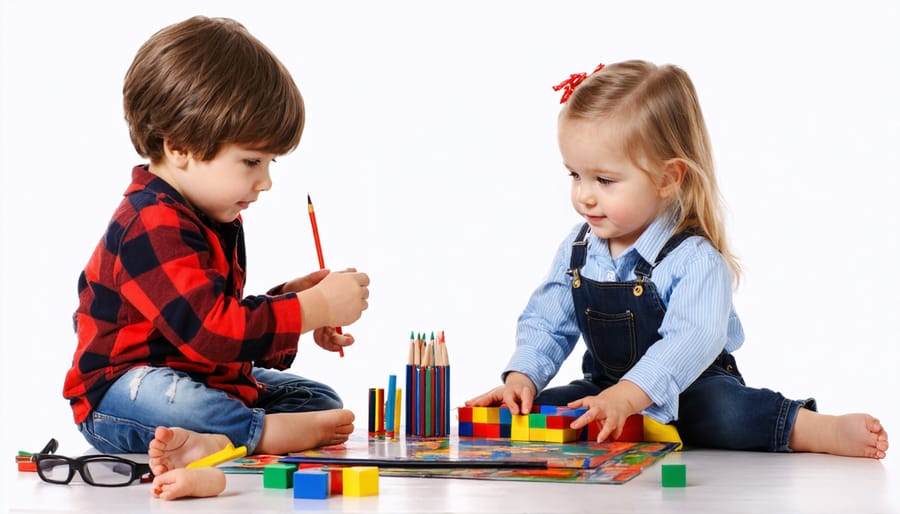
Problem-Solving Abilities
Cooperative play provides children with invaluable opportunities to develop their problem-solving abilities through real-world interactions. When children work together, they naturally encounter challenges that require creative solutions and compromise. For example, when building a block tower together, they must figure out how to balance different pieces and negotiate whose ideas to implement.
During cooperative play, children learn to identify problems, brainstorm solutions, and test different approaches as a group. They discover that combining different perspectives often leads to better outcomes than working alone. A child might suggest using larger blocks at the base of the tower, while another realizes they need a specific piece to make the structure stable.
These collaborative problem-solving experiences help children develop critical thinking skills and emotional resilience. They learn that setbacks are normal and that persistence pays off. When the block tower falls, they work together to rebuild it, perhaps with improvements based on what they learned from the previous attempt.
Parents and educators can support this development by allowing children to work through challenges independently while remaining available to offer guidance when needed. This balanced approach helps children build confidence in their ability to solve problems cooperatively.
Supporting Cooperative Play at Home
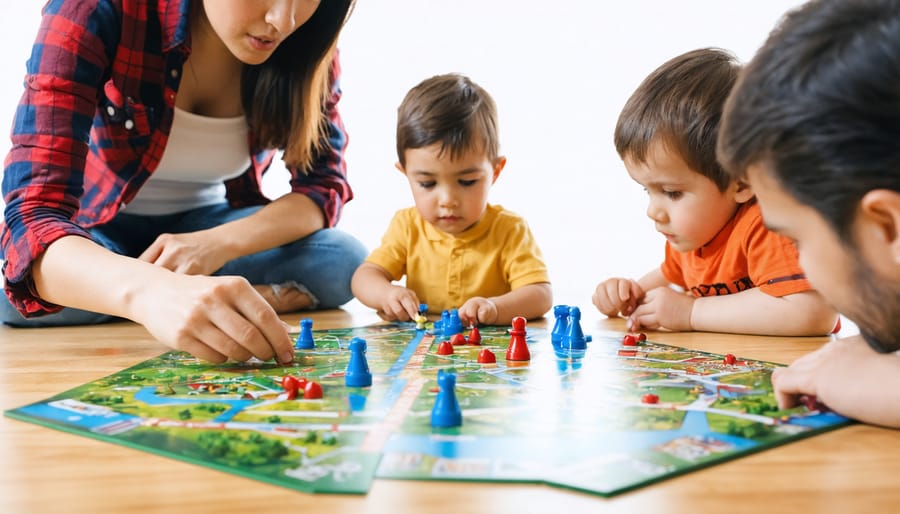
Age-Appropriate Activities
Different stages of development call for different types of age-appropriate play activities. For toddlers (2-3 years), simple cooperative activities like rolling a ball back and forth or playing peek-a-boo with a friend help introduce the concept of turn-taking and sharing.
Preschoolers (3-5 years) can engage in more structured activities like building block towers together, playing dress-up, or participating in simple board games. These activities help them practice negotiation, sharing, and working toward common goals.
School-age children (6-8 years) benefit from team sports, group art projects, and collaborative problem-solving games. Activities like putting on a puppet show, creating a group story, or working together on a science experiment foster communication and leadership skills.
Older children (9-12 years) can handle more complex cooperative challenges like organizing group performances, participating in team competitions, or working on long-term projects together. These activities help develop advanced social skills, strategic thinking, and emotional intelligence while strengthening peer relationships.
Creating Opportunities
Creating an environment that supports cooperative play doesn’t have to be complicated. Start by setting up activity stations that naturally encourage children to work together, such as a puppet theater, building blocks area, or dramatic play corner. These spaces should be large enough to accommodate multiple children and have enough materials for sharing.
Consider rotating toys and activities regularly to maintain interest and create new opportunities for collaboration. Simple items like parachutes, large puzzles, or board games can spark natural cooperation. Even everyday activities like setting up for snack time can become cooperative experiences when children work together to distribute plates or clean up afterward.
Structure activities that require multiple participants to succeed, such as team scavenger hunts or group art projects. For example, creating a mural where each child contributes a piece helps develop both individual creativity and group coordination. Remember to provide gentle guidance without taking over – sometimes stepping back allows children to naturally develop their cooperative skills.
For outdoor play, consider equipment that requires teamwork, such as see-saws or games that need multiple players. The key is to create situations where working together leads to more fun and better outcomes than playing alone.
When to Seek Support
While cooperative play is a natural part of child development, some children may need additional support to develop these important social skills. Watch for signs such as consistently playing alone even when other children are present, showing difficulty sharing or taking turns, becoming frequently overwhelmed in group settings, or struggling to follow game rules.
If your child seems unable to engage in back-and-forth play by age four, has trouble understanding others’ feelings, or shows extreme distress during group activities, these may be indicators that professional guidance could be helpful. Remember, every child develops at their own pace, but early intervention can make a significant difference.
Consider seeking support if you notice:
– Persistent difficulty joining group activities
– Regular conflicts with peers during play
– Strong resistance to sharing or collaborating
– Limited interest in interacting with other children
– Trouble understanding or following social cues
– Becoming easily frustrated or upset during group play
A pediatrician, child psychologist, or occupational therapist can evaluate your child’s development and provide appropriate strategies and interventions if needed. They may recommend specific activities, social skills groups, or therapeutic play sessions to help your child build confidence and competence in cooperative play.
Remember that seeking support is a sign of proactive parenting, not failure. Many children benefit from extra guidance in developing social skills, and professional support can help create positive experiences that foster healthy social development.
Cooperative play stands as a cornerstone of healthy child development, offering benefits that extend far beyond the playground. Through shared activities and collaborative experiences, children develop essential life skills that will serve them well into adulthood. The social bonds formed during cooperative play help build empathy, communication abilities, and problem-solving skills that are crucial for success in school, relationships, and future careers.
As parents, educators, and caregivers, we have the wonderful opportunity to foster these valuable experiences. By creating environments that encourage cooperation and providing gentle guidance when needed, we can help children discover the joy of working together. Remember that every child develops at their own pace, and celebrating small victories in cooperative play can boost confidence and motivation.
Whether it’s organizing group activities, facilitating shared projects, or simply allowing natural cooperative play to unfold, your support makes a difference. The skills children gain through cooperative play – from emotional regulation to leadership abilities – create a strong foundation for lifelong learning and social connection. Let’s continue to prioritize and celebrate cooperative play as an essential element of childhood development.

